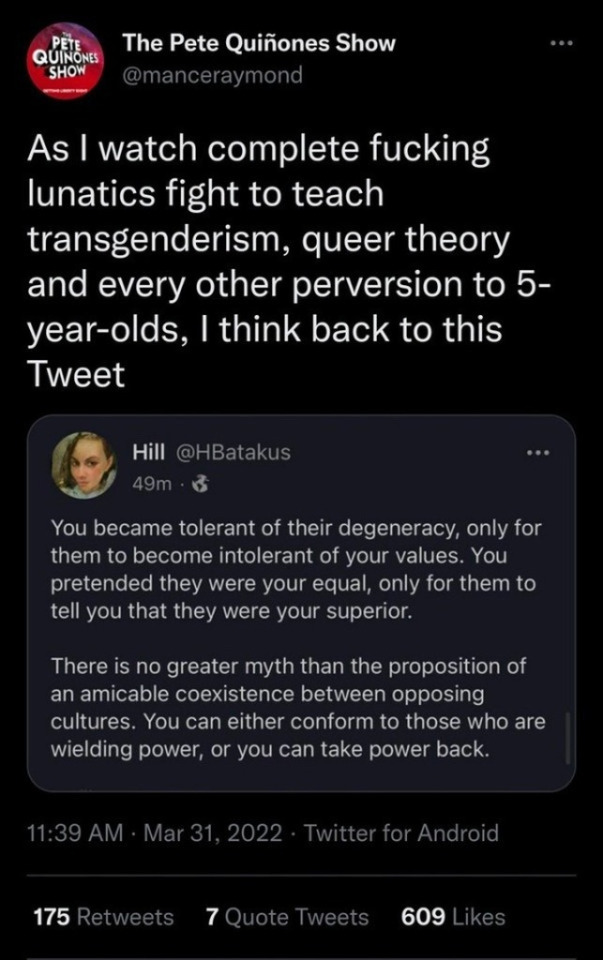[I’m still afflicted by some sort of upper-respiratory torment, and expect to spend the day under about a dozen blankets, so have a reprint from Eternity Road of fond memory. It first appeared there on July 28, 2007. Sadly, some of the embedded links no longer work. Sixteen years is long enough to lose a few blogging colleagues. – FWP]
By way of the esteemed Pommygranate, your Curmudgeon happened upon this emission by previously unknown Ruthie Zaftig in the wee hours:
Long, long ago (well really, about a month ago) Tom Paine wrote about the reasons for blogging. Blogging, he says, is a vain activity but a worthy one— the blogosphere enables us to escape our typecast roles that we fall into in everyday life. It lets us speak truth as we see it, unencumbered by “the conventions of everyday life.” Blogging lets us see past a person’s normal, public facade and into the inner workings of their mind, the heart of their being.
Meet them in their everyday lives and they would be playing their parts. We would not really know them. In a sense, they would not really be them. As bloggers (particularly anonymous or pseudonymous bloggers) their inner voices speak.
Ruthie goes on at length about this thesis, concluding thus:
A blogger’s identity—especially those who use pseudonyms and avoid personal references—can theoretically be free from outward social stigma and stereotypes— ideas and words judged by their worth and quality alone.
Your Curmudgeon must disagree. Rather strongly, at that.
Bloggers, like saner persons, can be partitioned into those who are the masters of their own souls and those who are not. The former type may have adopted what’s colloquially called a “role” — husband and breadwinner; mother and homemaker; pillar of the community; what have you — for practical reasons, but he plays it; it doesn’t play him. When he speaks, whether on the record, off it, or pseudonymously, he’s candid, sincere, and trustworthy. He might be wrong about any given thing, but he’s not trying to deceive you. What he tells you about himself is what he himself believes.
The latter type is the reverse. His “role” is his defense against a world he fears to show his real face. It’s stronger than he; that’s why he adopted it. It doesn’t matter whether you know his name or not, for even if you did, what you’d be getting from him when he opens his mouth is the role, not his heartfelt convictions or sincere desires.
Anyone not blinded by his own prejudices and fears can tell the two breeds apart, whether they adopt nommes-de-plumes or write under their public names. This gives the former, publicly named sorts an edge with your Curmudgeon; it means they’re willing to stand behind their statements regardless of what others might say or think.
But that’s not exactly what your Curmudgeon is here to talk about.
***
The cult of celebrity has taken an appalling toll upon the persons on whom it focuses. Take the much-reported descent of actress Lindsay Lohan into degeneracy as an example. Despite multiple prior brushes with the law and with serious self-inflicted harm, this young woman is apparently unable to control her desires for alcohol and cocaine — all the way to the extent of driving California’s already life-threatening roads in a state of intoxication that would induce paralysis in half the human race.
One must ask why. If there’s ever been anyone one could justly say had the world by the tail, it’s this beautiful, talented, wealthy young woman. Why would anyone so gifted and fortunate seek out the oblivion of routine intoxication? What objective fears for herself could she possibly have? What does she lack that her assets could not secure for her?
Well, actually, there are a couple of things.
The first is love. One price of being forever in the public eye is the loss of the ability to determine whether people actually see you when they look at you. A celebrity’s public image is seldom controlled by the celebrity; it’s almost always the creation of skillful flacksters whose sole interest is in the commercial possibilities of the person they promote. This is true even of the reports of “journalists” — yes, those are “sneer quotes” — from supposedly objective news organizations. A celebrity with a quiet, sane private life cannot be used to sell advertising space.
To be wrapped thus in an artificial veneer, however glamorous and pseudo-exciting, deprives one of the ability to take others at their “emotional word.” Every offering, advance, or gesture becomes subject to question: What does he really want from me? The undermining of the requirements of mutual trust makes intimacy remarkably difficult to achieve. It can even affect one’s relations with one’s parents, who are often seduced into becoming part of the “money machine” and stripped of their natural love for their child.
(Yes, parents do love their children. Overwhelmingly, and despite their many flaws. Why do you think infanticide is so rare? If you don’t think the point is relevant, you’ve never changed a diaper.)
The second thing is privacy. This is hardly an arguable point. The entertainment industry, like any other, is focused on profit. That’s not a condemnation; your Curmudgeon could hardly be accused of decrying capitalism, and despite the entertainment world’s many shortcomings, we would be worse off for its loss. But the cult of celebrity and the use of entertainers’ off-screen and off-CD personae as marketing vehicles for their movies, discs, and television shows has made it impossible for anyone significant in that industry to have a truly private life. They’re followed, whether they wish it or not, through every move they make. Even the ones who preserve some solitary space behind high walls and locked iron gates have to be aware at all times that the barriers that keep the “journalists,” paparazzi, and obsessives locked out also keep them locked in. Their marketability has imprisoned them in a cage of klieg lights and telephoto lenses.
In our era, when the mass media are everywhere and thousands scramble madly for every iota of potentially profitable attention, this may be unavoidable. It also suggests that anyone who heads into an entertainment career in full knowledge of the price of stardom might start out a trifle “tetched.” But those considerations stand apart from your Curmudgeon’s major thesis: the cult of celebrity is a mechanism that destroys the stars upon whom it focuses.
Yes, there are exceptions. Paul Newman and Joanne Woodward come to mind, as do Kevin Bacon and Kyra Sedgwick. These are to be commended for their fortitude. But such exceptions are rare, and are growing rarer as we speak.
But that’s not exactly what your Curmudgeon is here to talk about.
***
Like most Americans who own freestanding homes, your Curmudgeon is assisted in his toils
by a host of machines:
- Two cars
- A lawn tractor
- A walk-behind mower
- A snowblower
- A chain saw
- A hedge clipper
- An air compressor
- A wide variety of other power tools
- A washing machine and a dryer
- A dishwasher
- A furnace and a hot-water heater
- A water softener and a carbon-filtration system
- Two vacuum cleaners
- A carpet-steaming appliance
- Two fans and three window-mounted air conditioners
- A host of computers and related devices
As you would expect from a brute of gorilla-like strength with a Certified Galactic Intellect, your Curmudgeon could tear any of these devices down to their lowest components and reassemble them flawlessly. He could easily service any of them that might experience a breakdown, without so much as a tip of the fedora to paid service personnel. He can do all of these things, and he has…but not recently.
Life is too BLEEP!ing complicated and tiring already. Why add to one’s burdens when one could easily, at modest cost, shunt them onto the backs of others?
No doubt many Eternity Road readers are in sympathy, whether they possess your Curmudgeon’s array of skills or not. Our lives are fantastically complicated. Even given that he can hire out many irritations to the attention of paid specialists, the challenge of a typical day demands that the typical American exhibit competences of unprecedented variety and delicacy from the moment he rises to the moment he drops his briefcase or toolbelt in the foyer. It leaves him prostrate with exhaustion by six PM. He’d rather spend a hefty fraction of his income on those specialists than assume a greater burden than he already carries.
If you’ve been wondering why you have less time, energy, and inclination to play with your kids than your parents had for you, this is a large part of the answer.
Complexity is fatiguing all by itself. A complex situation that demands a response also demands a significant investment in analysis and the assessment of risks. Mental fatigue is just as important to our overall enervation as physical fatigue. Indeed, it might be more so.
One of your Curmudgeon’s favorite colleagues, Og the NeanderPundit, has said on many occasions that his most cherished dream is to retire to a cabin in the woods bereft of any technology more recent than the centerfire rifle. This is an undisguised cry for a return to simplicity — a return to a milieu in which one could expect to exercise complete personal control over every element that affects his life in any way, and still have time and energy left to ogle the girls and enjoy the sunset.
Your Curmudgeon knows exactly what Og means. He’s occasionally wished for it himself, as much as he might miss his broadband Internet connection.
But — you guessed it — that’s not exactly what your Curmudgeon is here to talk about. Then what, you may justly ask, is he here to talk about?
Why, the Girl Next Door, of course. What else?
***
One of Fritz Leiber’s delightful early short stories, “The Last Letter,” concerns Richard Roe, a young man in a bizarre future society where all communication-over-distance is monitored by agents of the State and everyone is expected to marry the Girl (or Boy) Next Door. Our hero spots a young beauty in his travels who is most definitely not the Girl Next Door and writes her a letter — don’t ask how it was conveyed to her; exercise a little willing suspension of disbelief, willya please? — to propose marriage. The mere act of writing that letter causes major convulsions among the Powers That Be, who intervene swiftly to determine what could possibly have moved young Richard to such a deviant act. He’s told that he’s supposed to marry the Girl Next Door. Everyone is.
That’s not too far from the way things used to be here in America. Minus the official inquisition for having written a letter, that is.
One of the measures of our lives’ greatly increased complexity is the geographical measure of our relationship-bonds. How far away was your spouse born and raised from where you were born and raised? How about your closest friends? Your associates at work? If your children are grown and out on their own, how far away from you do they live? In your routine personal communications, what’s the physical distance between you and the other party? (Include your chats on the Internet.)
It can be a bit frightening to tot it all up that way. Your Curmudgeon knows that very well. He’s blathered about it before. But its major significance is the increment of difficulty this complexity adds to the search for something all of us need: love and acceptance.
Allow your Curmudgeon a small but critical tangent. One of the prevalent emotional motifs of our time is the notion that all of us are entitled to “unconditional love.” You can hear this asserted in any forum you prefer, not merely on daytime talk shows. But your Curmudgeon would like to demur, in the fashion you all know so well:
BALDERDASH!
No one is inherently entitled to anything, whether physical, intellectual, emotional or spiritual. Each man must earn what he needs and desires, or receive it as a gift from someone favorably inclined toward him, or learn to do without it. Love is no exception.
Love always comes on a condition: the condition that one must be lovable.
Being lovable is a bit different from “being yourself,” one of the other maximally irritating mantras of our time. He who is focused on “being himself” is unlikely to be lovable; he’s too self-obsessed for that. He may be admirable in many ways, but without the openness to self-extension and generous accommodation of others that genuine intimacy demands, he will not be lovable — and he will not be loved. The Girl Next Door would find him weird and repellent…if she were still there.
Who is — or was — the Girl Next Door? Why, she was someone you knew from sustained proximity. Someone whose “little ways” are no surprise to you. Someone whose conduct was no more than mildly at variance from the norms dictated by polite society. Someone whose family was well known to you, so that you need have no fear of them, or of their interactions with your own kin. In other words, she was someone you could love, if you chose, without fearing anything too untoward in consequence.
But the Girl Next Door isn’t there today. At about age seventeen, she moves a great distance in physical, psychological, and/or emotional space. Usually, that distance is great enough to forestall any intentions you might have had toward her. You seldom wind up marrying her, whatever relations you might have had with her before she joined the Great American Diaspora.
The physical displacement is bad enough. The psychological displacement is worse: she almost always comes under the sway of “authority figures,” sometimes teachers or employers and sometimes just charismatic contemporaries, who are determined to wipe out her original, authentic self and replace it with something molded to suit a crabbed and monomaniacal ideology. The emotional displacement is worst of all: while those “authority figures” — why, yes, I do have a key labeled “Sneer Quote;” why do you ask? — are at work on her, her hunger for any sort of connection to others is steadily being transformed from an asset to a liability. She accepts random hookups as substitutes for genuine affection, and fastens on bright lights among the glitterati of the entertainment world to admire, in place of the uncelebrated but substantial heroes of her youth whose shoulders steadied the sky above her.
If the Girl Next Door returns home, it’s for a brief visit. Those who knew her before are stunned by the transformation, and not in a good way. The weird clothes and makeup, the tattoos and piercings, and the changes in diction and sentiments are signals that not all has gone as well for the Girl as her parents and their friends had hoped. When she concludes her visit and returns to the remote wherever, they’re secretly relieved. Their cherished image of her is forever compromised by the alien who came to call bearing her name and the vestiges of her face.
These are the fruits of the physical diaspora, the displacement of solidity in favor of celebrity, and the severance of our traditional connections to home, family, and neighborhood. In sacrificing these things, we don’t shed burdens as we might once have imagined; we discard the most important supports for life in a world more complex than anyone has ever managed to bear alone. We sacrifice all hope for the most critical simplicity of all: emotional simplicity, the sort that comes with knowing that one is accepted and loved, and can accept and love in return, without compromise or pretense.
And we sacrifice the Girl Next Door.
Good luck with that babe from the back of beyond you took into your bed. How long do you think it will be before you know her? Really know her, enough to be confident that the chemical infatuation that fueled your lusts will be enough to get you past her “little ways” — or her past yours?
Keep your Curmudgeon posted.
***
The opening segments of this tirade were not an accident. Their connections to one another and to the rest are not tenuous. Do you see them now?
A man will only seek to conceal his identity if his identity is an impediment or a burden to him — that is, if who he is stands athwart his path to his goals. In other words, he’ll conceal his true self if it complicates his acquisition of whatever he happens to want. This has been demonstrated to compelling effect in every imaginable venue; think “singles bars” and shudder along with your Curmudgeon.
A young woman of beauty, wealth, and talent will only embark on self-destruction by drink and drugs if she cannot cope with who she is, or who she’s been hyped to be. If “who she is” is be defective, but “who she’s been hyped to be” forbids her to reveal a flaw, she could implode as catastrophically as Marilyn Monroe. If “who she is” is sound, but “who she’s been hyped to be” demands that she be a degenerate party animal for the publicity it will garner her, she’ll be revulsed by her self-betrayal, and attempt to hide it from her consciousness. To both of these escapes, drink and drugs are a venerable avenue.
The purpose of all human striving is to get and keep what we want, and to avert or shed what we don’t want. The state of mind in which one is confident that there will arise no body- or mind-defying barriers to those meta-purposes is what your Curmudgeon means by simplicity.
Do you have enough of it for your needs?



















